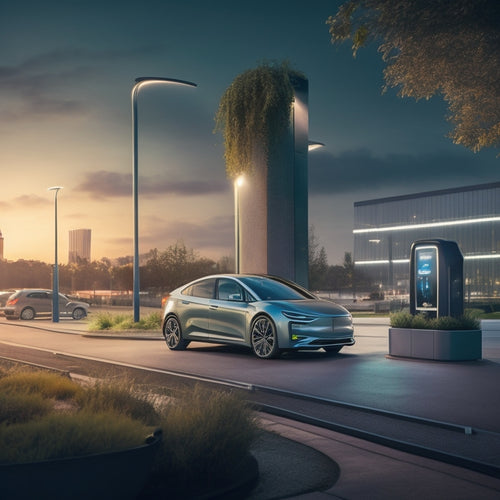
Home Battery System
Share
You're considering a home battery system to guarantee a reliable power supply, increase your property's value, and integrate with renewable energy sources. A home battery system provides backup power during grid failures, keeping essential appliances operational and critical medical equipment protected. It can also increase your property value by up to 10% and integrate seamlessly with renewable energy sources like solar and wind, reducing your carbon footprint. To get the most out of your system, you'll need to assess your daily energy demands and choose the right deep cycle battery technology. Now, take a closer look at the details that'll help you make an informed decision.
The Essentials
- Home battery systems provide reliable backup power supply during grid failures, ensuring safety and comfort for essential appliances.
- Integration with renewable energy sources like solar and wind enhances efficiency, reduces carbon footprint, and achieves energy independence.
- Home battery systems can increase property value by up to 10%, making properties more attractive to environmentally-conscious buyers.
- Deep cycle battery technology is ideal for home battery systems, with lifespans ranging from 5 to 15 years depending on maintenance and operating conditions.
- Proper maintenance practices, including regular monitoring and avoiding deep discharges, are crucial for extending battery lifespan and maximizing performance.
Reliable Power During Outages
When the grid goes down, you need a reliable backup power supply to keep your essential appliances running.
With a home battery system, you can enjoy power on demand, ensuring your lights stay on and your refrigerator keeps running.
This is especially important for households with critical medical equipment or sensitive electronics, which can be damaged by power surges during outages.
This means you can stay safe and comfortable during outages, without sacrificing convenience or productivity.
Back Up Power Supply
A home battery system's backup power supply is designed to provide you with reliable power during outages, seamlessly switching to stored energy when the grid goes down.
With a battery installation, you'll enjoy energy independence, reducing your reliance on the grid and experiencing cost savings in the long run. The backup power supply integrates seamlessly with renewable energy sources, guaranteeing a stable and efficient flow of energy. This means you'll have emergency preparedness covered, with a reliable source of power even during extended outages.
Additionally, a home battery system's backup power supply can help you lower your electricity bills by storing excess energy generated by your solar panels or wind turbines, and can also shave peak demand charges and reduce your overall energy usage during those times of the day when energy rates are at their highest.
Furthermore, a home battery system's backup power supply offers significant environmental benefits, reducing your carbon footprint and contributing to a cleaner, more sustainable future.
When it comes to maintenance requirements, modern battery systems are designed to be low-maintenance, with automated monitoring and self-testing capabilities. This guarantees your system is always running at peak levels, providing you with peace of mind and freedom from energy worries.
Power On Demand
With a reliable backup power supply in place, you can now enjoy power on demand, even during outages. This means you'll have access to electricity whenever you need it, without relying on the grid.
You'll be able to keep your lights on, your fridge running, and your devices charged, no matter what's happening outside. By integrating a solar battery storage system into your home, you'll access the full potential of renewable energy and create a more sustainable, dependable, and cost-effective power solution.
When the grid goes down, your home battery system kicks in, providing a seamless shift to backup power. This guarantees that your essential appliances and devices remain operational, giving you peace of mind and a sense of security.
With power on demand, you'll be able to maintain your daily routine, even in the face of an outage. This level of energy independence is a key aspect of sustainable living, allowing you to take control of your energy needs and reduce your reliance on the grid.
Increased Property Value
When you install a home battery system, you're not only ensuring reliable power during outages, but you're also elevating your real estate's value, which is especially important for homeowners who want to stay powered during outages with compact emergency power solutions.
By investing in a home battery system, you're fundamentally future-proofing your home and reaping long-term financial benefits, as it can also be integrated with off-grid systems and solar panels.
This enhanced feature can greatly increase your property's resale value, making it more attractive to potential buyers.
Boosting Real Estate
Installing a home battery system can increase your property value by up to 10%, according to various studies. This increase in real estate value can be attributed to the numerous benefits that come with energy independence.
By utilizing renewable energy sources and storing excess energy in your home battery system, you're not only reducing your environmental impact but also enjoying significant cost savings.
Government incentives and technological advancements in energy storage have made it more feasible for homeowners to invest in sustainable solutions. A home battery system seamlessly integrates with your smart home setup, ensuring a reliable and efficient energy supply.
Additionally, it enhances grid reliability by reducing peak demand and providing backup power during outages. As you reap the benefits of energy independence, your property value increases, making your home a more attractive option for potential buyers in the future.
Enhanced Resale Value
A home battery system greatly enhances your property's resale value, making it more attractive to potential buyers.
You'll appeal to those seeking energy independence and a modern living experience. By integrating a home battery system, you're not only reducing your reliance on the grid but also increasing your property's value.
The system's ability to store excess energy generated by your solar panels or wind turbines means you can power your home during outages or peak hours.
This level of energy independence is highly desirable, especially in areas prone to natural disasters or with frequent grid outages. Additionally, a home battery system can be seamlessly integrated with home automation systems, allowing you to monitor and control your energy usage remotely.
When it's time to sell, your property will stand out from the competition.
The added value of a home battery system can lead to a higher selling price and faster sale. You'll attract buyers who prioritize sustainability, convenience, and freedom from reliance on the grid.
Deep Cycle Battery Technology
You're likely wondering what makes deep cycle batteries suitable for home battery systems. The answer lies in their ability to withstand repeated charge and discharge cycles, which affects their life expectancy.
In fact, a high-performance solar power system battery can maximize renewable energy storage and reduce reliance on the grid solar battery system.
The cycle depth, or how deeply the battery is discharged, also plays a critical role in determining the battery's overall lifespan.
Battery Life Expectancy
As the heart of your home battery system, deep cycle batteries play an essential role in storing excess energy generated by your solar panels or wind turbines.
You rely on them to provide power when the grid is down or during periods of high energy demand. To maximize their lifespan, it's important to understand their life expectancy and how to maintain them properly.
Deep cycle batteries typically last between 5 to 15 years, depending on factors such as charging efficiency, depth of discharge, and operating conditions.
Proper battery maintenance tips, like monitoring temperature, ensuring correct charging, and avoiding deep discharging, can greatly extend their lifespan.
You should also keep in mind that charging efficiency plays a vital role in battery life expectancy. Inefficient charging can lead to reduced battery capacity and lifespan.
Cycle Depth Impact
Cycle Depth Impact
Five to seven hundred charge cycles can be expected from a well-maintained deep cycle battery, but this number significantly drops if the battery is frequently deeply discharged. This is because deep discharging reduces the battery's overall lifespan. As you consider your home battery system, it is vital to understand the impact of cycle depth on your battery's performance.
| Cycle Depth | Cycle Efficiency | Discharge Rate |
|---|---|---|
| 50% | 90% | 1C |
| 80% | 70% | 0.5C |
| 90% | 50% | 0.2C |
| 100% | 30% | 0.1C |
As shown in the table, a deeper cycle depth results in lower cycle efficiency and slower discharge rates. This means that if you frequently deeply discharge your battery, you can expect fewer charge cycles and reduced overall performance. To maximize your battery's lifespan and efficiency, it is imperative to monitor and manage your cycle depth effectively. By doing so, you'll be able to enjoy the freedom and flexibility that comes with a reliable home battery system.
Assess Your Energy Demands
You need to understand your energy usage patterns to determine the right home battery system for your needs.
Start by calculating your daily energy consumption in watt-hours (Wh), factoring in the appliances and devices you plan to power.
For instance, if you're looking to power your home with renewable energy, you'll want to contemplate solar battery storage solutions that can efficiently store excess energy generated during the day.
This will help you identify the required capacity and configuration of your battery system.
Energy Usage Patterns
Several factors influence your daily energy usage, and understanding these patterns is essential in determining the ideal home battery system for your needs. Your energy usage patterns are shaped by your lifestyle, appliance usage, and energy efficiency habits.
For instance, if you have energy-intensive appliances like electric vehicles or power tools, your energy demands will be higher. On the other hand, if you've invested in energy-efficient appliances and lighting, your energy consumption will be lower.
To optimize your home battery system, you'll need to assess your energy usage patterns and identify areas for improvement. This involves analyzing your energy bills, identifying peak usage hours, and understanding your energy consumption habits.
By doing so, you can identify opportunities for energy efficiency and optimize your energy usage forecasting. This information will help you determine the right battery capacity, type, and configuration for your home, ensuring you have a reliable and efficient energy supply that meets your needs.
Daily Energy Consumption
About 30% of your daily energy consumption occurs during peak hours, typically between 6 pm and 10 pm, when you're most likely to be using multiple appliances simultaneously.
This period is critical in understanding your energy demands, as it highlights your peak demand and usage trends. To optimize your energy consumption, you need to assess your energy demands accurately. You can do this by monitoring your energy usage through advanced energy monitoring systems, which provide real-time data on your consumption efficiency.
By analyzing this data, you can identify areas of inefficiency and adopt sustainable practices to reduce your energy consumption. Effective power management involves load balancing, which guarantees that your energy usage is distributed evenly throughout the day, reducing peak demand and conserving energy.
Lithium-Ion Battery Longevity
You're likely wondering how long your lithium-ion battery will last, and one key factor in determining its longevity is its cycle life expectancy.
This refers to the number of charge and discharge cycles a battery can handle before its capacity drops to 80% of its original value.
Understanding cycle life expectancy helps you estimate the battery's lifespan and plan for its eventual replacement.
Cycle Life Expectancy
Within the domain of lithium-ion batteries, cycle life expectancy represents a vital performance metric, directly influencing the overall longevity and reliability of a home battery system.
You should understand that cycle life expectancy refers to the number of charge and discharge cycles a battery can withstand before its capacity degrades to 80% of its initial value. This metric is essential because it determines how long your home battery system will remain effective.
To maximize cycle life expectancy, you must adopt ideal charging practices and follow battery maintenance tips. Avoid extreme temperatures, as they can accelerate degradation. Confirm your battery isn't deeply discharged, as this can reduce its lifespan. Avoid overcharging, as this can cause damage to the battery's internal components.
Frequently Asked Questions
Can I Use My Home Battery System With Solar Panels?
You can utilize the power of solar integration to achieve energy independence by pairing solar panels with a compatible battery system, allowing you to store excess energy and reduce reliance on the grid.
How Long Does It Take to Install a Home Battery System?
It'll take you a lifetime to wait for the perfect moment, but installing a home battery system won't! The installation process typically takes a few hours to a few days, depending on the battery capacity and your electrical setup, giving you freedom from grid dependence.
Are Home Battery Systems Compatible With All Electrical Systems?
When evaluating system compatibility, you'll find that not all electrical systems are created equal, adhering to varying electrical standards; therefore, it's vital to confirm the battery system you choose is compatible with your specific electrical setup for seamless integration.
Can I Monitor My Home Battery System Remotely?
You can monitor your energy storage remotely, thanks to advanced battery management systems offering remote access. This allows you to track performance, receive updates, and control your system from anywhere, giving you freedom and peace of mind.
Are There Any Government Incentives for Home Battery Systems?
You're sitting on a goldmine of savings! Yes, you can tap into federal tax credits of up to 26% and state rebates for energy storage systems, rewarding your environmentally conscious decision to utilize clean power and reduce carbon footprint!
Final Thoughts
You've got a home battery system that provides reliable power during outages, increases your property value, and employs deep cycle battery technology. By evaluating your energy demands, you can optimize your system. And with lithium-ion battery longevity, you can enjoy years of efficient energy storage. Did you know that a typical American home experiences over 15 power outages per year, lasting around 3.5 hours each? With a home battery system, you'll be prepared for the next outage, whenever it may strike.
Related Posts
-

Solid State Batteries in Electric Vehicles
Solid-state batteries revolutionize electric vehicles by offering a longer lifespan and higher energy density than tr...
-

Top Portable Refrigerators for Camping Adventures
When you're camping, having a reliable portable refrigerator can make all the difference for keeping your food fresh ...
-

Top 10 Off Grid Camping Gear Must-Haves
When you're off-grid camping, the right gear is crucial for a smooth expedition. Start with a durable, weather-resist...


